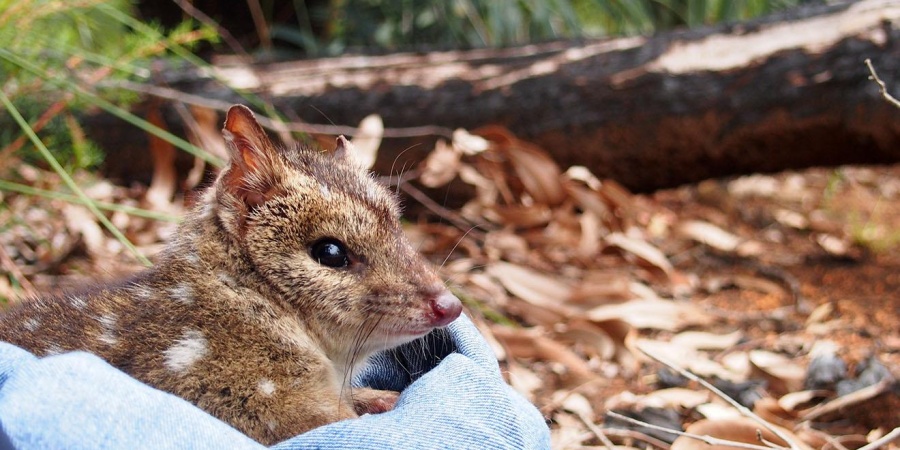
Chuditch. Photo by Georgina Anderson/DBCA
The care and use of animals in Western Australia is subject to provisions of the Animal Welfare Act 2002 (the Act) which provides for the welfare, safety and health of animals used for scientific purposes. An important part of the Act is the requirement of scientific institutions to be licensed and to operate according to the Australian code for the care and use of animals for scientific purposes (the Code). This is to ensure the ethical and humane care and use of animals for scientific purposes.
The Department of Biodiversity, Conservation and Attractions (DBCA) operates as a scientific institution in accordance with the conditions of its corporate Licence to use animals for scientific purposes, administered by the Department of Primary Industries and Regional Development (DPIRD).
To support evidence-based decision making and the conservation and land management functions of DBCA, staff use animals for research and education under the oversight of the DBCA Animal Ethics Committee (DBCA AEC). Research and education activities include observational survey and monitoring, survey and monitoring using live capture (including taking of biological samples, permanent marking, and sedation/anaesthesia for transmitter attachment/insertion), trapping for educational purposes (e.g. Nearer to Nature program, Fauna Management Course), translocations, development of introduced predator control methods, and humane euthanasia for collection of specimens and introduced predator control research.
DBCA has developed several standard operating procedures (SOPs) for common fauna survey and monitoring activities to assist staff in preparing their applications and to ensure projects follow AEC endorsed guidelines. The SOPs are also used by the AEC to efficiently assess proposed projects to ensure that activities involving fauna are undertaken to a consistent standard. The SOPs have been written for scientific and education purposes, however, may also be appropriate for other situations.
DBCA Animal Ethics Committee
The department has operated an Animal Ethics Committee (AEC) since 1990. The role of the AEC is to ensure that all staff involved in the use of animals for scientific purposes act in an ethical and humane manner in accordance with the Code.
The Code defines areas of responsibility and sets out the principles that guide activities to ensure standards are met. A key component of any institutional process is the establishment of an AEC which determines whether the proposed use of animals is justified according to the principles of the Code. The AEC is also responsible for monitoring the ongoing scientific activities.
The Code requires that the membership of the DBCA AEC must include wildlife veterinarians, scientists, animal welfare advocates and members of the community to ensure appropriate and representative oversight of our activities. See terms of reference (available for download below) for more information about the committee’s roles and responsibilities.
Standard Operating Procedures for animals
The following Department of Biodiversity, Conservation and Attractions (DBCA) Standard Operating Procedures (SOPs) are documents that provide best practice guidance for wildlife survey and monitoring activities. They are valuable tools that can be used to ensure surveys and monitoring programs are undertaken consistently, to a high standard, and importantly, address the welfare and wellbeing of animals. They help to ensure that data collected will be adequate, consistent and comparable.
SOPs are living documents. They require continual updating and regular review by the Animal Ethics Committee (AEC) as new techniques arise and/or old procedures are improved. The AEC is required to maintain existing SOPs and endorse all new standards, updates or additions as per the provisions outlined in the Australian Code for the care and use of animals for scientific purposes.
Advantages of SOPs are that they:
- act as a tool for communicating the department’s expectations in terms of animal welfare when applying wildlife monitoring or survey techniques
- promote quality though consistent collection of the data, even if there are changes in the personnel undertaking the survey or monitoring
- protect the health and safety of personnel by enabling jobs to be carried out in the safest way possible, and ensure that all of the safety, health, environmental and operational information is available to perform procedures with minimal impact
- facilitate training and proficiency in procedures, for both new personnel and for those that need re-training (e.g. after extended absence from a position)
- serve as a historical record for use when modifications are made to that procedure and when the SOP is revised
Current Standard Operating Procedure (SOP) documents
Openness Agreement
The Openness Agreement on Animal Research and Teaching in Australia was developed by the Australian and New Zealand Council for the Care of Animals in Research and Teaching (ANZCCART) and launched in August 2023.
To demonstrate its commitment to transparency and ethical decision-making associated with the use of animals for research and teaching, and to enable well-informed public discussion, DBCA has become a Signatory to this agreement. In becoming a Signatory to the Openness Agreement, DBCA pledges to meet all four of the Agreement’s commitments:
- We will be open about our involvement in the use of animals in research or teaching.
- We will enhance our communications with the media and the public about our use of animals in research or teaching.
- We will be proactive in providing opportunities for the public to find out about research or teaching
involving animals. - We will report annually on our efforts to improve openness in our use of animals in research or teaching.

If you have any questions about the DBCA AEC, please contact us at animalethics@dbca.wa.gov.au